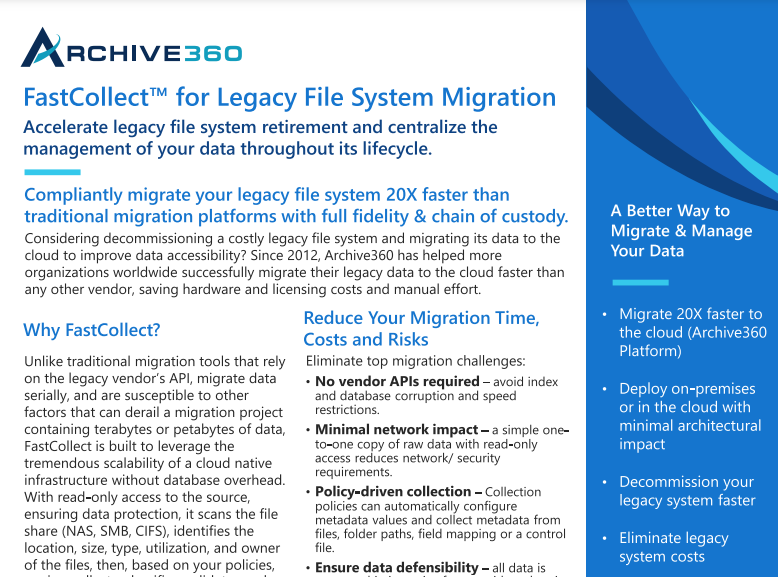Don’t Let Legacy File Systems Hold You Hostage!
Retire your legacy or active file system data to a more compliant, secure, scalable, and cost-effective storage and governance solution in the cloud.

Accelerate Legacy File System Decommissioning
Mitigate data risks and reduce storage costs.
Know what to migrate
At some point, legacy storage limitations, such as failure to keep up with security threats, poor data visibility, the risk of non-compliance with regulatory requirements, or an inability to handle large AI/ML workloads, force your organization to modernize its storage architecture. To better manage data growth, save costs, and gain control over data risks, you need to first understand your data.
- Know what and how much data is in the system.
- Know when the files were last used and who used them.
- Know which files are subject to compliance requirements.

Migrate faster, more reliably
Cloud migration of file data can be complex, costly, and time-consuming. Archive360 has performed thousands of migrations involving petabytes of data and knows all the potential pitfalls, ensuring your migration is completed quickly, efficiently, and cost-effectively.
- Lift & Shift: Migrate all files and their metadata, including the folder path, to less costly cloud storage.
- Files and their metadata are migrated as quickly as needed with no transfer speed restrictions (other than bandwidth / cost).
- Supports SMB, NFS, and dual share protocols.
- Maintain full file fidelity with all file permissions and access controls intact.
- Every file is validated with a complete chain of custody to ensure data integrity.

Accelerate Legacy File System Decommissioning
Mitigate data risks and reduce storage costs.
Know what to migrate
At some point, legacy storage limitations, such as failure to keep up with security threats, poor data visibility, the risk of non-compliance with regulatory requirements, or an inability to handle large AI/ML workloads, force your organization to modernize its storage architecture. To better manage data growth, save costs, and gain control over data risks, you need to first understand your data.
- Know what and how much data is in the system.
- Know when the files were last used and who used them.
- Know which files are subject to compliance requirements.
Reliance on data owners
Organizations can no longer continue to have communications, files, and application data trapped in isolated repositories and rely on employees to consistently classify, organize, and manage their communications and content according to policies. End users have many other priorities. Expecting them to remember policies, much less, apply them consistently, has proven to be futile.
Data over-retention
The easiest, and many incorrectly assume safest, approach to managing data is to retain it. The increased likelihood of a data breach, regulatory fines, and appearing in the headlines for the wrong reasons have amplified the risk of data over-retention and is forcing organizations to understand when data risk outweighs value so it can be appropriately managed and disposed.
Avoid vendor lock-in
Many network attached storage (NAS) vendors offer cloud backup solutions to optimize storage. These vendors typically store data in blocks, which optimizes read-write performance but creates issues when they move data to less-costly cloud storage:
- Only the operating system and the NAS knows where the blocks are located.
- So, you can only access the file through the storage device.
- And you are locked-in to using that vendor, otherwise you must restore all the data moved to the cloud.
- Given that there will likely be not enough space on the device, this can be a painfully slow and costly process.
Archive360’s platform stores the file and its metadata in its native format, so you’re not locked into any one vendor solution.

Centralize the Management of Your Data Throughout its Lifecycle
Gain direct control of your data regardless of the source.
Find Cross-System Data in a Single Search
Optimize Data Storage, Security & Governance
Enable AI with Untapped Data Sources
Find Cross-System Data in a Single Search
By migrating your legacy or active file share data to Archive360’s Unified Data Governance platform and decommissioning your legacy file system, you not only save on system licensing, maintenance, and support costs, but you can also access and manage all data without going to the source. The platform automatically analyzes, collects, and replicates data from all types of operational systems (communication, collaboration, file system, content management, and structured business applications) according to your data management policies.

Optimize Data Storage, Security & Governance
When data from your legacy or active file system is migrated to Archive360’s platform to meet compliance requirements, files, and their metadata:
- Are stored in less-costly cloud object storage.
- Are protected with unmatched security options including:
- Role- and attribute-based access controls.
- Tenant encryption keys to encrypt data at rest and in-transit.
- File encryption keys to limit file access to specific users.
- Content encryption keys to limit access to specific fields within a file and its metadata.
- A security gateway to manage keys apart from the data in the cloud in a different environment and location.
- Can be classified, enriched (use AI services to transcribe audio/video, translate languages, extract text from images, and more) and transformed to facilitate data discovery, review, and compliance.

Enable AI with Untapped Data Sources
Our platform’s benefits extend beyond compliance to providing a more expansive set of quality data for AI and Analytics to work with:
- Provide your AI/ML teams access to previously untapped data sources they can use to train their models, improve AI response accuracy, and guide better informed decisions.
- Give data engineers and scientists easier access to quality data through the platform’s systematic and consistent classification of data so they spend less time finding and preparing data and more time modeling and analyzing it.
- Archive aged generative AI workloads out of operational systems to a secure, centralized archive so you reduce data processing and storage costs, limit users’ ability to modify, delete or expose sensitive data, and automatically meet data retention / disposition requirements.




